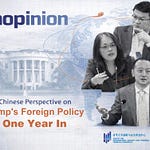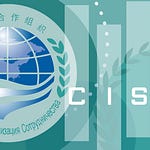The expert in today’s dialogue:
Key Points of Today’s Podcast:
When asked why he chose the title “Should the World Fear China?” for his new book, Zhou Bo explained that the question originated from an interview with a German media outlet. This question reflects the Western attitude towards China’s rise. As a country with a long-standing civilization and a vast population, China is rising with an unstoppable momentum—much like an elephant that continues to grow and strengthen. This naturally causes concern among the United States and Western countries and creates uncertainty among China’s neighboring countries. In response, Zhou Bo believes that China needs to address this issue directly and openly.
Based on decades of experience serving in the Chinese military, Zhou Bo pointed out that since the reform and opening-up, China has followed a path of peaceful rise and has not initiated any wars. During the 2020 China-India clash in the Galwan Valley, soldiers from both sides recognized the need for restraint, which indicates that confidence-building measures between China and India have played a certain role.
Regarding China’s military modernization over the past decades, Zhou Bo believes that China’s ambition to build a world-class military is no secret. Thanks to China’s industrial capacity, its defense industry is likewise robust. Following the Russia-Ukraine conflict, countries around the world have also come to realize the critical impact of modern technologies on warfare — and in these cutting-edge fields, China stands among the very best. This, in turn, gives China greater confidence in its military development.
On why China seeks to build a modernized military while having no intention of engaging in war, Zhou Bo argued that like all countries, China has legitimate demands to maintain military strength to safeguard its territory and sovereignty. At the same time, with extensive overseas interests, China’s navy carries the responsibility of protecting Chinese nationals and assets abroad. Notably, the PLA Navy also escorts foreign commercial vessels, demonstrating China’s active role in assuming international responsibilities. Through these efforts, China not only protects its own ships and energy supply routes but also contributes to the security of global maritime trade.
Meanwhile, Zhou highlighted that international security involves both tangible and intangible elements. For example, dispatching military forces to protect Chinese citizens overseas is entirely understandable and acceptable to the international community. However, beyond the safety of people, there are vast tangible interests such as overseas investments, corporate assets, and oil field rights that also require protection. Additionally, intangible security concerns exist, such as ensuring the uninterrupted operation of international sea lines of communication (SLOCs). Since maritime transport is the most cost-efficient, roughly 90% of global trade depends on these shipping routes, making their security critically important.
Regarding China’s establishment of its first overseas military base in Djibouti, Zhou Bo explained that what the Chinese Navy seeks in the Indian Ocean is “access, not bases.” China harbors no ambition to control the region’s strategic straits, but likewise does not wish to see these vital waterways fall under the control of other powers, as the vast majority of China’s energy imports rely on these maritime routes.
Zhou also clarified the origins of the so-called “String of Pearls” narrative. He noted that the term was first coined by the American defense contractor Booz Allen Hamilton in 2005, suggesting China might one day develop a chain of military bases stretching from its own shores to East Africa. Now, two decades later, China has only one overseas base—in Djibouti—disproving the original alarmist hypothesis.
As the world’s largest exporter and second-largest importer, China depends more heavily than any other nation on the security of international sea lanes of communication. Therefore, it is both reasonable and necessary for the Chinese Navy to assume responsibilities for safeguarding China’s overseas interests and the security of maritime routes. Zhou emphasized, however, that public and media awareness within China of the importance of naval power remains limited, and these essential facts and perspectives urgently need to be better understood and communicated domestically.
Regarding the recent surge in China’s public demonstrations of breakthroughs in military technology over the past six months, Zhou Bo explained that this trend serves multiple purposes. On one hand, it showcases the strength of China’s industrial and defense sectors, reflecting the nation’s growing capabilities in cutting-edge military technologies. On the other hand, it directly addresses long-standing Western criticisms over China’s lack of military transparency. For example, when China released test flight footage of two different stealth fighter jets on the same day, it sent a clear message of openness regarding its defense developments. At the same time, these demonstrations are designed to boost public confidence within China, reinforcing national pride in the strength of its defense industry and the country’s capacity to safeguard its core interests.
On the question of what the modernization of the People’s Liberation Army (PLA) means for China, Zhou Bo emphasized that the future still holds many unknowns and challenges. The Chinese government has made clear statements that even as China’s military strength grows, it will not seek hegemony. However, whether peace can be continuously maintained will depend on how China navigates increasingly complex challenges—some stemming from its own need to safeguard national interests, and others from the expectations of the international community that China will assume a larger role in contributing to regional and global stability. Overall, Zhou expressed strong confidence in China’s peaceful development. This confidence is rooted not only in repeated pledges made by China’s leadership, but also in the country’s deep historical and cultural traditions.
Regarding discussions about China’s defense spending — and the related concern over whether other countries might feel uneasy about China’s rise—Zhou Bo emphasized that China’s peaceful development is not a matter of luck but the result of considerable self-restraint. He cited incidents such as the NATO bombing of the Chinese embassy in Belgrade during the Kosovo conflict and aerial confrontations between Chinese and U.S. military aircraft in the South China Sea. Any of these episodes could have provoked uncontrolled anger from China, yet the country consistently managed to remain calm and exercise restraint through various means.
This restraint is also reflected in China’s defense budget. For decades, China’s military spending has remained below 2% of its GDP—a proportion in line with NATO standards—underscoring the country’s rational and measured approach to national defense. Zhou argued that if the world hopes for a peaceful and stable China, then the international community also has a responsibility to create a security environment in which China can feel safe.
In addition, Zhou Bo elaborated on the distinction between the “Maritime Silk Road” and the so-called “String of Pearls” strategy. He explained that today, China in fact has two concentric circles: one is the overland Belt and Road Initiative (BRI), and the other is the Maritime Silk Road. Zhou emphasized that the Belt and Road represents an unprecedented effort by a developing country like China, not only for commercial cooperation but also as a form of assistance to partner countries. He noted that the initiative is not solely about trade but equally about providing help and support. This is particularly significant because the Belt and Road roughly overlaps with what the international community calls the “arc of instability.” By building infrastructure and promoting development along this line, the project can greatly improve the livelihoods of people living in these regions, thereby reducing the likelihood of terrorism and other security threats. In this sense, Zhou argued, the Belt and Road is not merely an economic cooperation framework but also an important initiative for enhancing regional security and stability.
Looking ahead, Zhou Bo expressed optimism about the image of China in the mid-21st century. He observed that as the international horizons of the Chinese people continue to expand and as China actively encourages foreigners to visit and engage with the country, mutual understanding between China and the rest of the world will steadily deepen. Zhou also recalled the cosmopolitan spirit of the Tang Dynasty, when China served as a cultural metropolis of the world, welcoming large numbers of foreign residents and religious communities. He argued that future China should inherit this tradition of openness, strength, and humility, becoming a nation that earns the respect and affection of people around the globe.
In conclusion, Zhou emphasized that a safe, prosperous, and friendly China can contribute meaningfully to global peace and security, playing a constructive role in building a safer and more prosperous world for all.

















